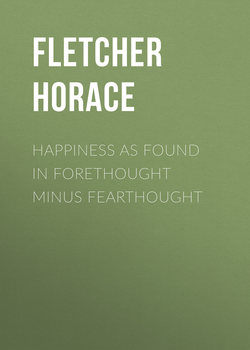Читать книгу Happiness as Found in Forethought Minus Fearthought - Fletcher Horace - Страница 1
ОглавлениеPREFACE
TO
SIXTH THOUSAND
"Happiness" was written in answer to many questions elicited by the publication of "Menticulture."
The "Introduction" is not material to the subject except to show the sources of the suggestions relative to profitable living contained in the two books.
The vital truths underlying the philosophy of life can be intelligently stated in a few hundred words, both as regards the proper cultivation of the body, or physical equipment, and as regards the cultivation of the mind, so that they may do the best work of which they are capable. False example and false teaching, however, have so impressed habits of weakness on the body and the mind that the chief aim of curative suggestion should be to disabuse. That is, to cause people to discard bad habits of thinking and doing in order that normal, healthy tendencies of action and of thought may take their place.
The difficulty of the task undertaken by any student and advocate of reform is not the intelligent statement of the simple truth, but the discovery and refutation of a complication of errors which have assumed the reality of truth. Simile and illustration, some logic and much ridicule, are among the weapons that have been effective in combating old habits of wrong thinking, but it is impossible to say which argument will fit a particular case.
Each of the illustrations used in this book has been the means of curing some one person of some phase of fearthought, and together they have released many from that dread enemy of health and happiness called "Fear."
The normal condition of Nature is healthy growth – evolution or progression – and Man's chief function in assisting her is first the removal of weeds, or other deterrents to the natural process, and afterwards the maintaining of quarantine against their return.
True Happiness is the Evidence and Fruit of Conscious Usefulness.
The wider the opportunity for usefulness the greater and keener the happiness resulting therefrom. Consciousness of being one's best and doing one's best, however, regardless of scope, is the only way to unalloyed happiness, and to the accomplishment of the highest ideals. There can be no more miserable, sorry and harrowing condition than that called "Indifference."
The separating of fearthought from forethought is not alone valuable because of the personal comfort of being fearless, but it is especially useful in that the energy made possible by the divorce is available in assisting others to be strong and helpful to themselves and to each other.
If attention is once directed to the pulling of weeds, to the removal of deterrents, to the eradication of the germs of disorder, the pursuit will become most fascinating, owing to the quick and happy response of Nature in her willingness to "Do the rest."
One of the marvels revealed by study of the question of the possibility of a Perfect Social Quarantine, having for its aim a protection that will not permit any child to escape care, is the comparatively small areas of the propagating centers in which are bred the germs of social disorder.
This subject is treated in a book, now in press, called "That Last Waif; or, Social Quarantine."
The same insignificance of origin applies to individual, moral and physical deterrents to happiness which afflict otherwise healthy men and women. The tap-roots of all unhappiness are not formidable in the light of present knowledge.
Whoever is less than keenly happy is the victim of errors or illusions whose germs are easy to kill when found. It is the especial object of this book to help those who are suffering unhappiness to find the tap-roots of their troubles.
Auditorium Annex,
Chicago, September 5th, 1898.
